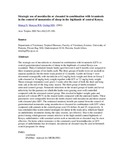| dc.contributor.author | Maingi, N | |
| dc.contributor.author | Gichigi, M.N | |
| dc.contributor.author | Munyua, W.K | |
| dc.date.accessioned | 2013-05-26T07:17:54Z | |
| dc.date.available | 2013-05-26T07:17:54Z | |
| dc.date.issued | 2002 | |
| dc.identifier.citation | Acta Tropica 2002 Nov;84(2):93-100. | en |
| dc.identifier.uri | http://hdl.handle.net/11295/25851 | |
| dc.description.abstract | The strategic use of moxidectin or closantel in combination with levamisole (LEV) to control gastrointestinal nematodes of sheep in the highlands of central Kenya was examined. Thirty Corriedale female lambs aged between 6 and 8 months were assigned to three treatment groups of ten lambs each. The three groups of lambs were set stocked on separate paddocks for the entire study period of 12 months. Lambs in Group 1 were dewormed strategically with moxidectin at 0.2 mg/kg body weight and those in Group 2 with closantel at 10 mg/kg body weight together with LEV at 7.5 mg/kg body weight. These strategic treatments were given 3 weeks after the onset of both the short and long rains and at the end of the long rainy season. The third group of lambs remained untreated (control group). Nematode infections in the treated groups of lambs and larval infectivity for the pastures on which the lambs were grazing were well controlled compared with the untreated control group. This resulted in higher weight gains and packed cell volume (PCV) in the treated lambs compared with the untreated lambs. These parameters were comparable between the lambs treated with moxidectin and those treated with closantel plus LEV. The estimated monitory benefit per animal from the control of gastrointestinal nematodes using moxidectin or closantel in combination with LEV when compared with animals in the control group were US dollars 26 and 25, respectively. It was concluded that worm control strategies for sheep in the study area, which are based on anthelmintic treatments during the rainy seasons, are effective. Due to the extended period during which pastures remain infective in the high rainfall central highlands of Kenya, anthelmintics with sustained action such as moxidectin or closantel may be most effective. On farms where resistance to the commonly used benzimidazoles or LEV groups of anthelmintics has developed, moxidectin or closantel may be used in helminth control programs for sheep. | en |
| dc.language.iso | en | en |
| dc.publisher | University of Nairobi | en |
| dc.title | Strategic use of moxidectin or closantel in combination with levamisole in the control of nematodes of sheep in the highlands of central Kenya | en |
| dc.type | Article | en |
| local.publisher | Department of Veterinary Pathology, Micribiology and parasitology, University of Nairobi, Kenya | en |

